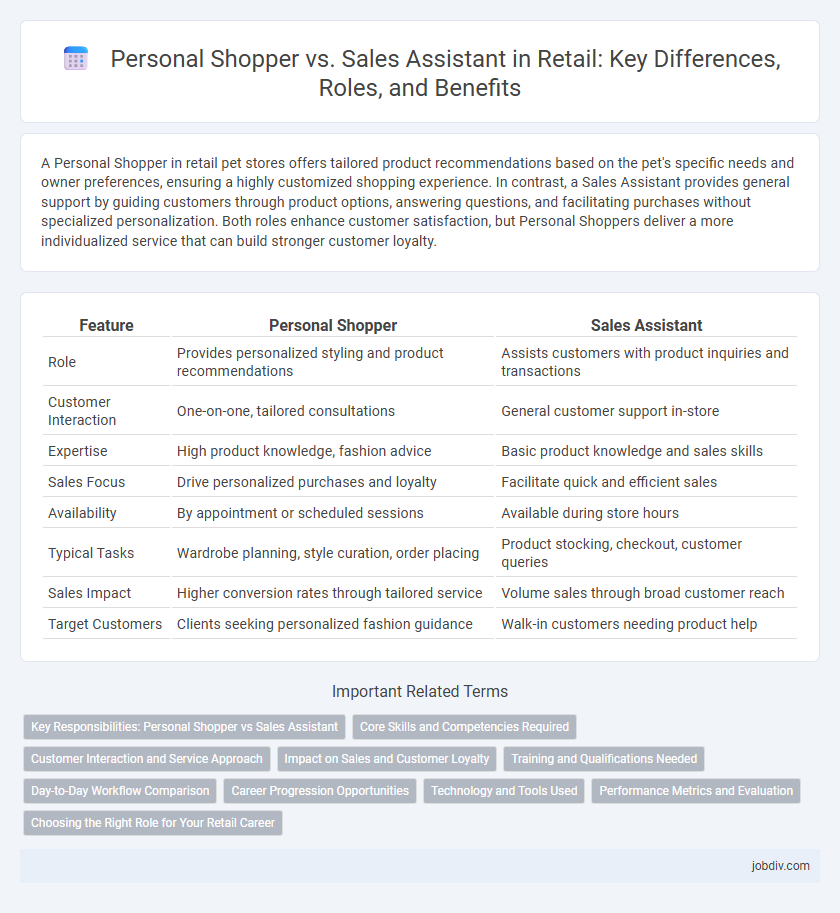A Personal Shopper in retail pet stores offers tailored product recommendations based on the pet's specific needs and owner preferences, ensuring a highly customized shopping experience. In contrast, a Sales Assistant provides general support by guiding customers through product options, answering questions, and facilitating purchases without specialized personalization. Both roles enhance customer satisfaction, but Personal Shoppers deliver a more individualized service that can build stronger customer loyalty.
Table of Comparison
| Feature | Personal Shopper | Sales Assistant |
|---|---|---|
| Role | Provides personalized styling and product recommendations | Assists customers with product inquiries and transactions |
| Customer Interaction | One-on-one, tailored consultations | General customer support in-store |
| Expertise | High product knowledge, fashion advice | Basic product knowledge and sales skills |
| Sales Focus | Drive personalized purchases and loyalty | Facilitate quick and efficient sales |
| Availability | By appointment or scheduled sessions | Available during store hours |
| Typical Tasks | Wardrobe planning, style curation, order placing | Product stocking, checkout, customer queries |
| Sales Impact | Higher conversion rates through tailored service | Volume sales through broad customer reach |
| Target Customers | Clients seeking personalized fashion guidance | Walk-in customers needing product help |
Key Responsibilities: Personal Shopper vs Sales Assistant
Personal shoppers specialize in personalized service, curating product selections based on individual client preferences and needs, often handling styling advice and wardrobe planning. Sales assistants manage general customer service duties, including stocking shelves, processing transactions, and assisting with product inquiries to facilitate smooth in-store operations. The distinction lies in personal shoppers providing tailored, high-touch experiences, while sales assistants focus on broad, day-to-day retail support.
Core Skills and Competencies Required
Personal shoppers excel in personalized client engagement, fashion expertise, and inventory knowledge to curate tailored shopping experiences, while sales assistants require strong communication, product knowledge, and multitasking abilities to support customers and efficiently manage retail operations. Core skills for personal shoppers include active listening, trend awareness, and styling proficiency, whereas sales assistants prioritize customer service, point-of-sale systems expertise, and teamwork. Mastery of these competencies ensures effective customer satisfaction and drives sales performance in retail environments.
Customer Interaction and Service Approach
Personal shoppers offer highly personalized customer interaction by curating selections tailored to individual preferences and style, enhancing the overall shopping experience. Sales assistants focus on providing immediate support, product information, and assistance during the purchase process, ensuring efficient and helpful service. Both roles prioritize customer satisfaction, but personal shoppers emphasize relationship-building while sales assistants concentrate on transactional support.
Impact on Sales and Customer Loyalty
Personal shoppers significantly boost sales by offering personalized recommendations tailored to individual customer preferences, enhancing the shopping experience and increasing average transaction value. Sales assistants support customer satisfaction through general product knowledge and in-store guidance, improving overall store efficiency but often generating less sales uplift compared to personal shoppers. The tailored service from personal shoppers fosters stronger customer loyalty and repeat visits, making them a critical asset for premium retail segments focused on long-term client relationships.
Training and Qualifications Needed
Personal shoppers typically require advanced training in fashion trends, customer psychology, and personalized styling techniques to cater to individual client preferences effectively. Sales assistants need foundational retail training, product knowledge, and basic customer service skills to support daily store operations and assist a broad customer base. Specialized certifications in visual merchandising or retail management may enhance qualifications for both roles, but personal shoppers often pursue additional courses in luxury brand knowledge and client relationship management.
Day-to-Day Workflow Comparison
Personal shoppers focus on personalized styling and curating wardrobe selections, spending most of their day consulting clients and researching trends to tailor unique looks. Sales assistants handle a broader range of tasks including inventory management, restocking shelves, processing transactions, and assisting walk-in customers with general product inquiries. Both roles support sales goals, but personal shoppers deliver customized experiences while sales assistants ensure smooth daily store operations.
Career Progression Opportunities
Personal shoppers often experience faster career progression by specializing in personalized client services and luxury retail markets, leading to roles such as styling directors or client relationship managers. Sales assistants typically advance through broader retail management tracks, gaining experience that can lead to positions like store manager or regional sales supervisor. Both roles benefit from strong customer service skills, but personal shoppers leverage personalized expertise to access niche career opportunities.
Technology and Tools Used
Personal shoppers leverage advanced CRM systems and personalized AI-driven recommendation engines to tailor shopping experiences, enhancing customer satisfaction and efficiency. Sales assistants primarily use POS systems and inventory management tools to facilitate transactions and maintain stock accuracy. Both roles benefit from mobile devices and real-time data access, but personal shoppers rely more heavily on predictive analytics and customer profiling technology.
Performance Metrics and Evaluation
Personal Shopper performance metrics prioritize personalized customer satisfaction scores, average transaction value, and client retention rates, reflecting customized service effectiveness. Sales Assistant evaluations focus on sales volume, transaction speed, product knowledge accuracy, and upselling success to measure efficiency and product expertise. Both roles benefit from regular customer feedback and conversion rate analysis to optimize retail performance and improve shopper engagement.
Choosing the Right Role for Your Retail Career
Personal shoppers offer personalized retail experiences by curating items tailored to individual customer preferences, ideal for those who excel in one-on-one client relationships and styling expertise. Sales assistants focus on general customer service, inventory management, and in-store sales support, suited for individuals who thrive in dynamic environments and enjoy direct sales interactions. Selecting the right role depends on your skills in personalized service or multitasking within fast-paced retail settings, shaping your career growth and job satisfaction.
Personal Shopper vs Sales Assistant Infographic

 jobdiv.com
jobdiv.com